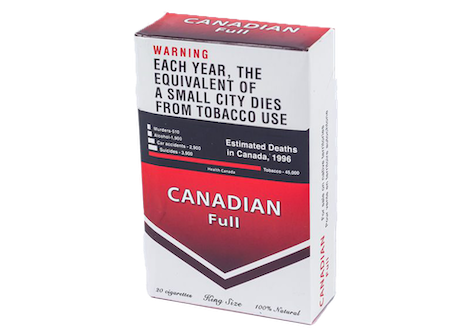

If you think illegal cigarettes are a victimless crime, think again.
In Ontario, it is illegal for a smoker to be in possession of illegal tobacco products.1
And yet, Ontario’s illegal cigarette trade is one of the country’s fastest-growing industries. It is making criminals rich, endangering public safety, derailing public health, and costing the Ontario government over one billion dollars a year.
If you are smoking illegal cigarettes, do you know what you are buying? Do you know it is against the law?2 Are you okay with supporting organized criminal networks that are connected to drug dealing, human trafficking and gun violence?3
Can you spot the difference?
The cigarettes in plain packaging and with a large health warning are legal. The cigarettes in colourful packaging are illegal.


How do I recognize illegal cigarettes?
Illegal cigarettes are untaxed cigarettes that typically do not carry any tax stamps. They often come in colourful packages without the health warnings that legal cigarettes are required to carry.
It doesn’t matter how you come into possession of illegal cigarettes. Whether you are buying them at a First Nations “smoke shack” or from a friend or retail clerk, anyone without Indigenous status as defined by the Indian Act who has unstamped tobacco products is breaking the law.
No way to stop minors from smoking
Crime pays—at least, it does in Canada
Guns, drugs, human trafficking
Destroying the Canadian dream
For mom-and-pop convenience store owners, illegal tobacco has hit like a tsunami, leaving nothing behind. These hardworking business owners rely on adult smokers purchasing legal cigarettes to keep their businesses afloat. In many communities, these businesses provide essential services to the rest of the population, things like postal services or essential goods that people would otherwise have to travel a long way to purchase.
Convenience store operators are also often new Canadians working to build a better life for their families. They have watched their Canadian dreams disappear as their business is stolen by criminal networks, sometimes operating right outside their doors and often facing no consequences.
What can I do?
Don’t buy it.
If you are an adult smoker, don’t buy it. You know that it directly supports organized crime.
Don’t stock or sell it.
If you’re a retailer, don’t stock or sell it. It undermines your industry, fuels organized crime and degrades the community.
Report it.
If you see someone selling illegal cigarettes, report them to Crime Stoppers.
Tell the government enough is enough.
Take one minute to send a letter to your MPP demanding action against this growing criminal enterprise.
Sources
1. https://www.ontario.ca/page/illegal-tobacco#:~:text=If%20you%27re%20convicted%20of,1%2C001%20to%2010%2C000%20unmarked%20cigarettes
6. https://publications.gc.ca/collections/collection_2021/scrc-cisc/PS61-39-2020-eng.pdf (Page 4)
8. https://macdonaldlaurier.ca/mli-files/pdf/MLICommentary_May2018_Leuprecht_Fweb.pdf